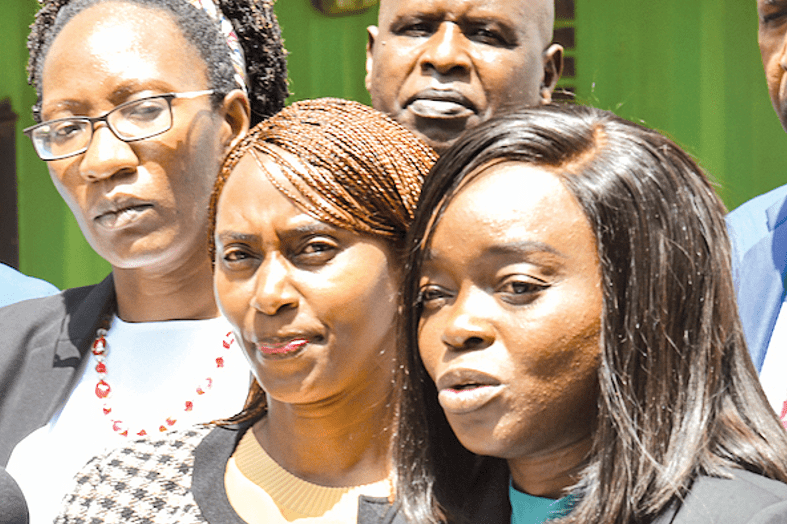State raises red flag over spike in Mpox cases

The government yesterday raised alarm over a spike in Mpox cases, saying at least 20 suspected victims could be freely mingling with the public. At a press conference yesterday, the Ministry of Health said it was currently screening 10 of the samples collected to be able to confirm whether they carry the virus.
Health Cabinet Secretary Deborah Barasa called on the public to be able to differentiate between confirmed cases from suspected ones, announcing that the government is well prepared to tackle any emergency if an outbreak is declared.
And this appears quite different from the way the Covid-19 cases were handled the moment a person has been suspected with total isolation. Dr Barasa, while addressing her maiden news conference as a substantive Cabinet Secretary for Health, assured the country that there is no cause for alarm as the government had re-activated all the response platforms.
“We had suspected cases as has been informed, the test has been done, so we are waiting for the turnaround time to confirm. So far, we only have that one case that has recovered,” said the CS at the National Public Health Laboratories housed at Kenyatta National Hospital. She announced that the ministry had activated the Public Health Emergency Operation Centre (PHEOC) and the Incident Management System for Mpox which oversees overall coordination efforts in the country.
“Similarly, the National Rapid Response Teams have been deployed to provide technical assistance to counties that have reported suspected cases,” she said, noting that the counties had also activated the emergency response mechanisms, with 25 County Emergency Operation Centers (EOCs) currently active and providing coordinated efforts. “All counties have been directed to activate their Rapid Response Teams (RRTs) that are crucial in case investigation and contact tracing,” said Barasa.
She reported that over 300, 000 travellers had been screened at some points of entry across the country where surveillance had been enhanced. She said the single case of confirmed Mpox had been treated, and healed and most of his contacts followed up, and none developed the disease.
“Additionally, the ministry has followed and tested 29 suspected cases, of which all have tested negative,” she said.
To allay anxiety over recent media reports, both on the social and mainstream news spaces, that suspected cases could be mingling freely with the public, therefore fear of transmission, Director General for Health, Dr Patrick Amoth called on the country to be patient.
He pointed out that once the ministry receives a sample, it divides it into four small ones; which are distributed to the Centers for Disease Control (CDC), the National Virology, Walter Reed and the National Public Health laboratories for screening.So, we only come up with a result that’s confirmed once we have had collated results from all these labs,” he said this will help the ministry to be certain when announcing confirmed cases of Mpox.
Correct position
Therefore, according to Amoth the sharing of the sample among the laboratories leads to a delay that’s being witnessed and furthers the reason for anxiety among Kenyans. “It’s better for us to delay coming up with a correct position than to send out an interim result that may be misleading to the public,” he stated.
Further, he pointed out that the ministry responds to all sources of potential cases; be it rumours or truth.
“We have sent an alert to all the 47 counties that have received that communication, and there are rapid response teams who should be able to respond.
“We will be able to do our analysis, where testing is required and we will be able to come back to you with correct information,” he said. The government in collaboration with the Ministry, he said is well equipped in preparedness to counter the spread of the Mpox outbreak in the country.
Amoth said the ministry has taken several interventions to protect the public from the outbreak noting, “we have activated the public health emergency operation centre and the incident management system for Mpox which oversees overall coordination and response efforts in the country.” “Testing of suspected cases is currently being conducted at MOH National Public Health laboratories in collaboration with partner institutions such as KEMRI,” he said, adding that the ministry followed and tested 29 suspected cases of which all tested negative.
Knowledge gap
He disclosed that the government has strengthened communication through continuous engagement with stakeholders and the community, which has helped bridge the knowledge gap among the public. Clinically, Mpox has an incubation period of five to 14 days but may vary from one to 21 days, which is the time from infection to the appearance of signs and symptoms.
Barasa urged the public, especially those with a travel history to countries reporting Mpox cases or coming into contact with a suspected case to be vigilant with symptoms like skin rash, fever, headache and muscle aches.











